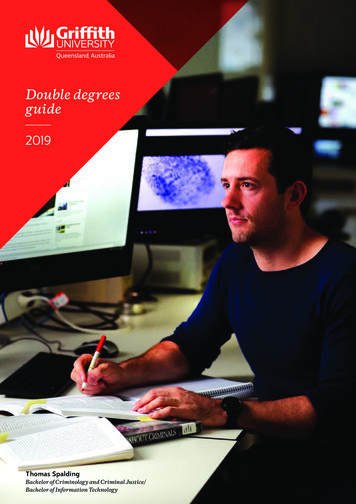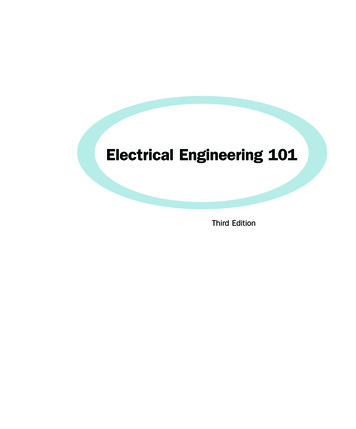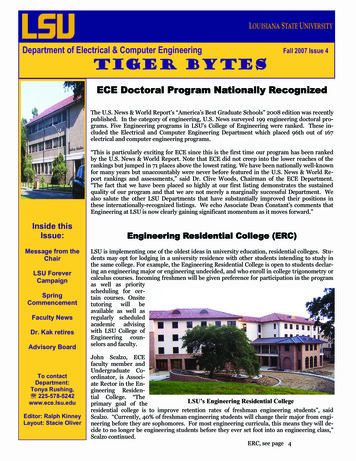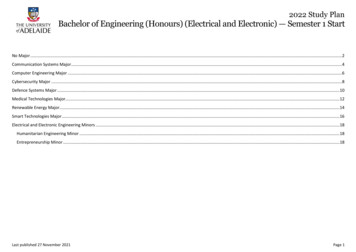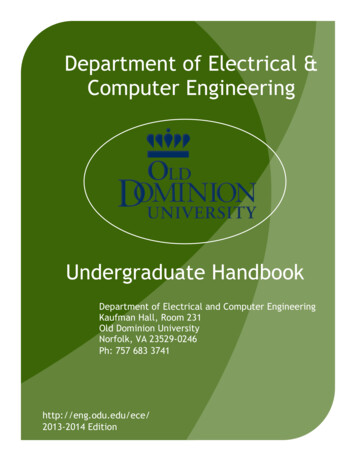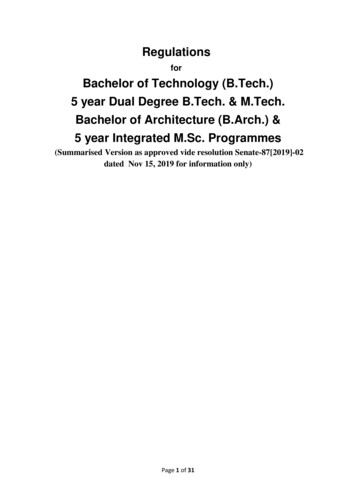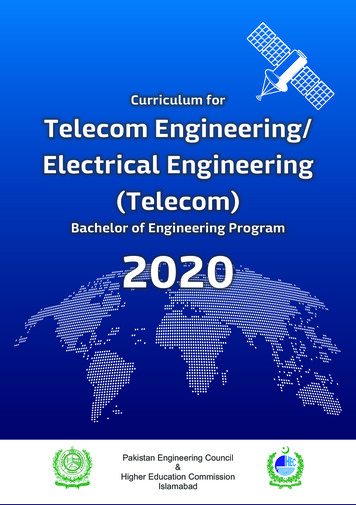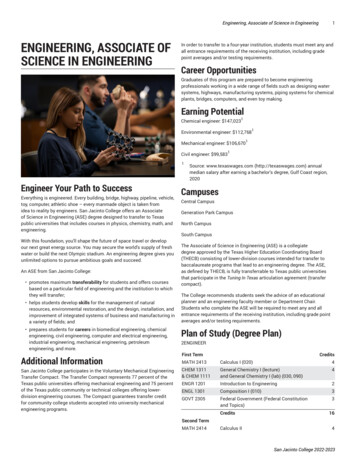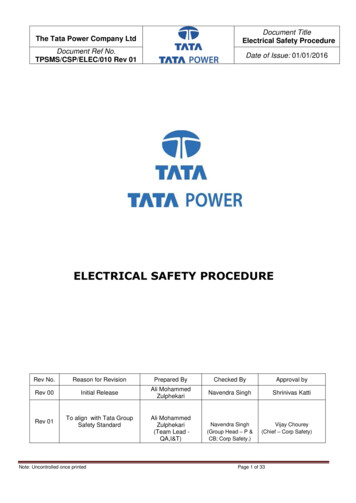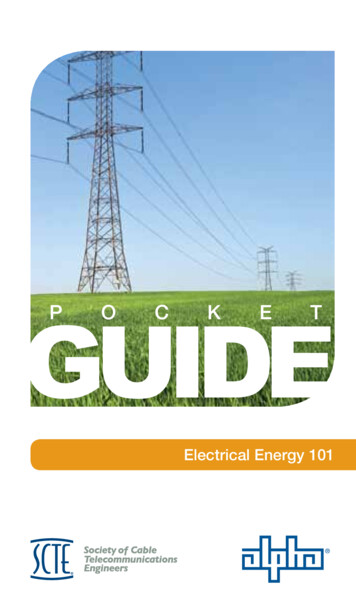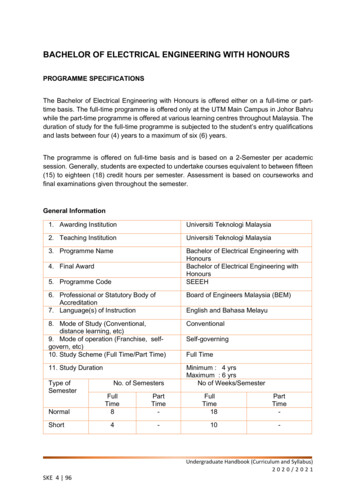
Transcription
BACHELOR OF ELECTRICAL ENGINEERING WITH HONOURSPROGRAMME SPECIFICATIONSThe Bachelor of Electrical Engineering with Honours is offered either on a full-time or parttime basis. The full-time programme is offered only at the UTM Main Campus in Johor Bahruwhile the part-time programme is offered at various learning centres throughout Malaysia. Theduration of study for the full-time programme is subjected to the student’s entry qualificationsand lasts between four (4) years to a maximum of six (6) years.The programme is offered on full-time basis and is based on a 2-Semester per academicsession. Generally, students are expected to undertake courses equivalent to between fifteen(15) to eighteen (18) credit hours per semester. Assessment is based on courseworks andfinal examinations given throughout the semester.General Information1. Awarding InstitutionUniversiti Teknologi Malaysia2. Teaching InstitutionUniversiti Teknologi Malaysia3. Programme NameBachelor of Electrical Engineering withHonoursBachelor of Electrical Engineering withHonoursSEEEH4. Final Award5. Programme Code6. Professional or Statutory Body ofAccreditation7. Language(s) of InstructionBoard of Engineers Malaysia (BEM)8. Mode of Study (Conventional,distance learning, etc)9. Mode of operation (Franchise, selfgovern, etc)10. Study Scheme (Full Time/Part Time)Conventional11. Study DurationMinimum : 4 yrsMaximum : 6 yrsNo of Weeks/SemesterType ofSemesterNormalShortSKE 4 96English and Bahasa MelayuNo. of SemestersFullTime8PartTime-4-Self-governingFull TimeFullTime1810PartTime-Undergraduate Handbook (Curriculum and Syllabus)2020/2021
Course ClassificationBachelor of Electrical Engineering with Honours - rsity Coursesa. Generalb. Languagec. Entrepreneurshipd. Co-Curriculum2382326.3%ii.School/Programme Core8662.8%iii.Programme Electives1510.9%Total137100%Engineering Coursesa) Lecture/Project/Laboratoryb) Workshop/Field/Design Studioc) Industrial Trainingd) Final Year Project8966Total Credit Hours for Part A101Related Coursesa) Applied Science/Mathematic/Computerb) Management/Law/Humanities/Ethics/Economyc) Languaged) Co-Curriculum15AB36Total Credit Hours for Part A and B137Undergraduate Handbook (Curriculum and Syllabus)2020/202126.3%1083Total Credit Hours for Part BTotal Credit Hours to Graduate73.7%100%137 credit hoursSKE5 96
Award RequirementsTo graduate, students must: Attain a total of not less than 137 credit hours (SEEE) with a minimum CGPA of 2.0. Complete Professional Skills Certificates (PSC).Programme Educational Objectives (PEO)After having exposed to 3 to 5 years working experience, our graduates should becomeprofessionals who demonstrate the following competencies:CodePEO1PEO2PEO3Intended Educational ObjectivesBecome Electrical Engineers who are competent, innovative, and productive inaddressing customer needs.Grow professionally with proficient soft skills.Demonstrate high standards of ethical conduct, positive attitude, and societalresponsibilities.Programme Learning Outcomes (PLO)After having completed the programme, graduates should be able to demonstrate thefollowing competencies:CodePLO1Programme Learning OutcomesAbility to apply knowledge of mathematics, science and electrical engineeringto the solution of complex engineering problems.PLO2Ability to perform research-based analysis, conduct experiments and interpretdata for complex engineering problems.Ability to identify, formulate, conduct research literature to analyse complexengineering problems using engineering knowledge.PLO3PLO4PLO5PLO6PLO7SKE 6 96Ability to apply engineering practice and use modern engineering, and IT toolsfor complex engineering problem with an understanding the limitations of thetechnology.Ability to design solutions for complex engineering problems and designsystems and processes that meet specified needs with appropriateconsideration for public health and safety, culture, society, and environment.Ability to articulate ideas, communicate effectively, in writing and verbally, oncomplex engineering activities with the engineering community and withsociety at large.Ability to function effectively as an individual, as a member or as a leader indiverse teams.Undergraduate Handbook (Curriculum and Syllabus)2020/2021
PLO8Ability to recognise the need for, and have the preparation and ability toengage in independent and life-long learning in the broadest context oftechnological change.PLO9Ability to comprehend the impact of global and contemporary issues, therole of engineers on society including, health, safety, legal and culturalissues, and the consequent responsibilities relevant to professionalengineering practices and engineering problems.PLO10Ability to comprehend and evaluate the sustainability and impact ofprofessional engineering work in the solutions of complex engineeringproblems in societal and environmental contexts.PLO11Ability to grasp and execute responsibility professionally and ethically inprofessional engineering practices.PLO12Ability to demonstrate knowledge and understanding of engineering andmanagement principles, and economic decision-making to manage projects inmultidisciplinary environments.PROFESSIONAL SKILLS CERTIFICATE (PSC)New PSC courses are introduced to new and current students starting from Session2020/2021. Students are required to undertake and pass Five (5) Professional SkillsCertificate (PSC) courses of UTM Institute for Life Ready Graduate (UTM ILeague). Thesecourses are offered and managed by School of Professional and Continuing Education(SPACE) in collaboration with Schools or Faculties. Students are required to register thecourses through SPACE Website.List of PSC courses are as follows:No.PSC COURSECOMPULSORY COURSES1Design Thinking for Entrepreneur2Talent and Competency Management3English Communication Skills for GraduatingStudents (ECS)ELECTIVE COURSES4Occupational Safety, Health & Environment (OSHE)5.(Compulsory to all FE students)Choose ONE elective course from the following list:1. Data Analytics for Organization2. Construction Measurement (Mechanical &Electrical Works)3. Professional Ethics and Integrity4. Other electives courses offered in futureUndergraduate Handbook (Curriculum and Syllabus)2020/2021OFFERED AND MANAGEDBY SPACE INCOLLABORATION WITHUTM ExciteUTM Career Centre(UTMCC)Language AcademyFaculty of Engineering (FE)Schools or Faculties at UTMSKE7 96
COURSE MENUBachelor of Electrical Engineering with Honours - SEEEHYEAR 1: SEMESTER 1CodeSEEE 1012CourseCredit2SEEE 1013Introduction to ElectricalEngineeringElectrical Circuit AnalysisSECP 1103C Programming Techniques3SSCE 1693Engineering Mathematics I3UHLB 1112English Communication Skills2UHMS 1182Appreciation of Ethics andCivilizations (for Local Students)Philosophy and Current IssuesORAppreciation of Ethics andCivilizations (for InternationalStudents)2UHIS 1022 ORUHMS 1182Pre-requisite3TOTAL CREDIT15CUMULATIVE CREDITS15YEAR 1: SEMESTER 2CodeSEEE 1022CourseCredit2SEEE 1073Introduction to ScientificProgrammingElectronic Devices and CircuitsSEEE 1223Digital Electronics3SEMU 2113Engineering Science3SSCE 1793Differential Equations3UHIS 1022Philosophy and Current Issues (forLocal Students)2UHLM 1012Malay Language for Communication2 (International Students)SKE 8 963TOTAL CREDIT16CUMULATIVE CREDITS31Pre-requisiteSEEE 1013Undergraduate Handbook (Curriculum and Syllabus)2020/2021
YEAR 2: SEMESTER 1CodeCourseCreditSEEE 2073Signals and Systems3SEEE 21333SSCE 1993Electronic Instrumentation andMeasurementFundamentals of Electrical PowerSystemsEngineering Mathematics IIUHMT 1012Graduate Success Attribute2UHLB 2122Academic Communication Skills2SEEE 2423Pre-requisite3SEEE 10133SSCE 1693TOTAL CREDIT16CUMULATIVE CREDITS47YEAR 2: SEMESTER 2CodeCourseCreditPre-requisiteSEEE 2263Digital Systems3SEEE 1223SEEE 2523Electromagnetic Field Theory3SSCE 1993SEEE 27422SSCE 21932nd Year Electronic DesignLaboratoryEngineering StatisticsUBSS 1032Introduction to Entrepreneurship2UHLB 3132Professional Communication Skills2UKQF 2**2Elective of Co-Curricular ServiceLearning23TOTAL CREDIT17CUMULATIVE CREDITS64Undergraduate Handbook (Curriculum and Syllabus)2020/2021SKE9 96
YEAR 3: SEMESTER 1CodeCourseCreditPre-requisiteSEEE 3133System Modeling and Analysis3SEEE 2073SEEE 3223Microprocessor3SEEE 1223SEEE 3533Communication Principles3SEEE 2073SEEE 3732Common 3rd Year Laboratory2SEEE 4443Power System Analysis3SSCE 2393Numerical Methods3TOTAL CREDIT17CUMULATIVE CREDITS81SEEE 2423YEAR 3: SEMESTER 2CodeCourseCreditPre-requisiteSEEE 3133SEEE 3143Control System Design3SEEE 3742Specialized 3rd Year Laboratory2SEEE 4423Power System Engineering3SEEE 4443SEEE 4433Power Electronics and Drives3SEEE 2423SEEE 4463High Voltage Technology3SEEE 4443UHL* 1112Elective of Foreign Language2UKQT 3001Extracurricular Experiential Learning1(ExCEL)TOTAL CREDIT17CUMULATIVE CREDITS98YEAR 3: SEMESTER 3CodeSEEE 4926CourseCreditPractical Training6TOTAL CREDITCUMULATIVE CREDITSSKE 10 96Pre-requisite6104Undergraduate Handbook (Curriculum and Syllabus)2020/2021
YEAR 4: SEMESTER 1CodeCourseCreditSHMS 4542Engineering Management2SEEE 4633Electrical Machines3SEEE 4723Capstone Project3SEEE 4812Final Year Project Part I2SEE* 4**3 /Field Elective 1 / PRISMS Elective 13Field Elective 2 / PRISMS Elective 23TOTAL CREDIT16CUMULATIVE CREDITS120Pre-requisiteSEEE 2423SEE*5**3SEE* 4**3 /SEE*5**3YEAR 4: SEMESTER 2CodeCourseCreditSEEE 4012Professional Engineering Practice2SEEE 4824Final Year Project Part II4SEE* 4**3 /Field Elective 3 / PRISMS Elective 33Field Elective 4 / PRISMS Elective 43SEE* 4**3Field Elective 53UHIT 2302Science and Technology Thinking2Pre-requisiteSEEE 4812SEE*5**3SEE* 4**3 /SEE*5**3TOTAL CREDIT17CUMULATIVE CREDITS137FIELD ELECTIVES- POWER ENGINEERINGCodeCourseCreditPre-requisiteSEEE 4453Power System Control3SEEE 4423SEEE 4613High Voltage Testing and3SEEE 44633SEEE 44333SEEE 4433CalibrationSEEE 4643Control and Design of PowerElectronic SystemSEEE 4653Photovoltaic and Wind EnergySystemsUndergraduate Handbook (Curriculum and Syllabus)2020/2021SKE11 96
SEEE 4663Electricity for Sustainable Energy3SEEE 4423SEEE 4673Electricity Market (Electrical Energy3SEEE 44433SEEE 4443CreditPre-requisiteMarket)SEEE 4683Power System Design andOperationFIELD ELECTIVES- CONTROL ENGINEERINGCodeCourseSEEE 4113Modern Control Theory3SEEE 3143SEEE 4153Digital Control Systems3SEEE 3143SEEE 4173Industrial Process Control3SEEE 3143SEEI 3133Industrial Instrumentations and3SEEE 2133ApplicationsSEEI 4173Advanced Transducers and Sensors3SEEI 3133SEEI 4313PLC and SCADA System Design3SEEE 3143SEEI 4363Industrial Control Network3SEEE 3143SEEM 4173Artificial Intelligence3FIELD ELECTIVES- ELECTRONIC ENGINEERINGCodeSEEL 3613CourseSemiconductor MaterialsCreditPre-requisite3SEEE 1073EngineeringSEEE 3263Electronic System3SEEE 1073SEEL 4223Digital Signal Processing 13SEEE 2073SEEL 4273CAD with HDL3SEEE 2263SEEL 4283Analog CMOS IC Design3SEEE 1073SEEL 4373IC Testing Techniques3SEEE 2263SEEL 4283SEEL 4743Basic Digital VLSI Design3SEEE 2263CreditPre-requisiteFIELD ELECTIVES- COMMUNICATION ENGINEERINGCodeCourseSEET 3573Microwave Engineering3SEEE 3533SEET 3583Digital Communication Systems3SEEE 3533SKE 12 96Undergraduate Handbook (Curriculum and Syllabus)2020/2021
SEET 3623Data Communication and Networks3SEEE 3533SEET 4523Optical Communication Systems3SEEE 3533SEET 4533Wireless Communication Systems3SEET 3573SEET 4543RF Microwave Circuit Design3SEET 3573SEET 4593Acoustic Engineering3SEEE 3533SEET 4613Antenna Theory and Design3SEET 3573SEET 4623Network Programming3SEET 3623SEEE Elective Courses for PRISM (CHOOSE MAXIMUM 4)CodeCourseCreditSEEE 5533Power Electronics Systems3SEEE 5583High Voltage and Electrical Insulation3SEEE 56033SEEE 5633Power System Analysis and ComputationalMethodPower System Devices and ApparatusSEEL 5123Advanced Microprocessor System3SEEL 5173Advanced Digital System Design3SEET 5313Communications and Computer Networks3SEET 5413Advanced Digital Communication3SEEL 5113Advanced Nanoelectronics Devices3SEEL 5193Advanced Analog CMOS IC Design3SEEM 5753Advanced Instrumentation and Measurement3SEEM 5713Artificial Intelligence and Applications3SEEM 5703Control Systems Engineering3SEET 5313Communications and Computer Networks3SEET 5513Sustainable Design, Engineering andManagement3SEET 5423Wireless Communication Systems3SEET 5523Internet of Things Technology3Undergraduate Handbook (Curriculum and Syllabus)2020/2021Pre-requisite3SKE13 96
PRISMS ELECTIVE COURSESFor students who intend to enroll into PRISMS programme, refer to the PRISMS Section fora list of related elective courses associated with the postgraduate programmes.RequirementsStudents who are eligible to apply for PRISMS are those with academic qualification who arein Year 3 Semester 2 with cumulative average grade value of CGPA 3.3 and above. Studentscan apply for PRISMS in Year 3 Semester 2 through the Program Integrasi Sarjana MudaSarjana (PRISMS) application form and must be recommended by the Academic Advisor,approved by the Program Director and certified by the Chair of School or Dean of Faculty.GRADUATION CHECKLISTTo graduate, students must pass all the stated courses in this checklist. It is the responsibilityof the students to ensure that all courses are taken and passed. Students who do not completeany of the course are not allowed to graduate.Bachelor of Electrical Engineering with Honours - SEEEHNO.CODECOURSECREDITEARNED(JKD)BACHELOR OF ENGINEERING (ELECTRICAL)1.SEEEIntroduction to Electrical1012Engineering2.SEEEElectrical Circuit Analysis10133.SEEEIntroduction to Scientific1022Programming4.SEEEElectronic Devices and1073Circuits5.SEEEDigital Electronics12236.SEEESignals and Systems20737.SEEEElectronic Instrumentation &2133Measurement8.SEEEDigital Systems22639.SEEEFundamentals of Electrical2423Power SystemsSKE 14 96CREDITCOUNTED(JKK)223322333333333333TICK( )IFPASSEDUndergraduate Handbook (Curriculum and Syllabus)2020/2021
SEEE4824SEEE4926SEE* 4**3/ SEE*5**3SEE* 4**3/ SEE*5**3SEE* 4**3/ SEE*5**3SEE* 4**3/ SEE*5**3SEE* 4**3SECP1103Electromagnetic Field Theory332nd Year Electronic DesignLabSystem Modeling & Analysis2233Control System Design33Microprocessor33Communication Principles33Common 3rd Year Laboratory22Specialized 3rd YearLaboratoryProfessional EngineeringPracticePower System Engineering222233Power Electronics and Drives33Power System Analysis33High Voltage Technology33Electrical Machines33Capstone Project33Final Year Project Part I22Final Year Project Part II44Practical Training66Field Elective 1 / PRISMSElective 1Field Elective 2 / PRISMSElective 2Field Elective 3 / PRISMSElective 3Field Elective 4 / PRISMSElective 4Field Elective 5C Programming Techniques333333333333Undergraduate Handbook (Curriculum and Syllabus)2020/2021SKE15 96
34.35.SEMU2113SHMS4542Engineering Science33Engineering Management221019533333333331515TOTAL CREDIT OFENGINEERING COURSES(a)MATHEMATICS COURSES (Faculty of Science)1.SSCEEngineering Mathematics I16932.SSCEDifferential Equations17933.SSCEEngineering Mathematics II19934.SSCEEngineering Statistics21935.SSCENumerical Methods2393TOTAL CREDIT OFMATHEMATICS COURSES(b)UNIVERSITY GENERAL COURSESCluster 1: Appreciation of Philosophy, Value and History(Faculty of Social Sciences and Humanities)1.UHMSAppreciation of Ethics and21182Civilizations (for LocalStudents)UHIS 1022 Philosophy and CurrentIssues (for InternationalORStudents)UHMSOR1182Appreciation of Ethics andCivilizations (for InternationalStudents2.UHIS 1022 Philosophy and Current2Issues (for Local Students)UHLMMalay Language 2 (for1012International Students)Cluster 2: Generic Skills1.UHMTGraduate Success Attributes210122.UBSSIntroduction to21032EntrepreneurshipCluster 3: Knowledge Enhancement1.UHIT 2302 The Thought of Science and2TechnologySKE 16 9622222Undergraduate Handbook (Curriculum and Syllabus)2020/2021
Cluster 4: Co-Curriculum and Service Learning1.UKQF 2**2 Elective of Co-Curricular22Service Learning2.UKQTExtracurricular Experiential113001Learning (ExCEL)Cluster 5: Language Skills(Language Academy, Faculty of Social Sciences and Humanities)1.UHLBEnglish Communication Skills2211122.UHLBAcademic Communication222122Skills3.UHLBProfessional Communication223132Skills4.UHL* 1112 Elective Of Foreign Language22TOTAL CREDIT of2121UNIVERSITY GENERALCOURSES (c )TOTAL CREDIT TO137131GRADUATE (a b c)OTHER COMPULSORY COURSES - PROFESSIONAL SKILLS CERTIFICATE (PSC). Students are required to enrol and pass FIVE (5) PSC courses, in order to beeligible to graduate. Please refer to page FE 8 in the UG Academic Handbook, for moreinformation about PSC courses.COMPULSORY PSC COURSES (Enroll all 4 courses)1GSPXDesign Thinking for EntrepreneurXXXX2GSPXTalent and Competency ManagementXXXX3GSPXFaculty Engineering Safety Pass (FESP)MODULE 1 - compulsory for SKM, SKT and SKE studentsXXXXMODULE 2 – compulsory for SKA, SC, SKBSK students4GSPXEnglish Communication Skills for Graduating StudentsXXXX(ECS)ELECTIVE PSC COURSE (Choose 1 only)1GSPXData Analytics for OrganizationXXXX2GSPXWritingXXXX3GSPXConstruction Measurement (Mechanical & ElectricalXXXXWorks)4GSPXProfessional Ethics and IntegrityXXXX5GSPXMore elective courses to be added in futureXXXXUndergraduate Handbook (Curriculum and Syllabus)2020/2021SKE17 96
COURSE SYNOPSISSEEE 1012 : INTRODUCTION TO ELECTRICAL ENGINEERINGThis course serves as a general introduction to electrical engineering programmes offered bythe School of Electrical Engineering (SEE), Universiti Teknologi Malaysia (UTM). Studentsundertaking this course will be exposed to attributes of electrical engineers from bothacademic and practical points of view. Soft skills and knowledge that are necessary in theengineering world will be introduced to the students. The students will have a clearerunderstanding on the responsibilities of electrical engineers to the society. By exploringcontemporary issues, the students would be able to suggest sustainable solutions to themankind and its environment.SEEE 1013 : ELECTRICAL CIRCUIT ANALYSISThis course introduces students to the basic laws, methods of analysis and theorems for directcurrent, DC and alternating current, AC circuit, such as, Ohms Law, Kirchhoff’s Current andVoltage Laws, Mesh and Nodal Analysis and Thevenin’s and Norton’s Theorems. Based onthese, the students are expected to be able to solve for variables in any given DC and ACelectric circuits. The students also exposed to the steady-state electrical circuit. Afterwards,the relevant concepts in transient circuit analysis for first and second order circuit are taughtto the students. With the knowledge learned, the student would be able to apply the basiclaws, theorem and methods of analysis for solving completely with confidence variousproblems in circuit analysis.SEEE 1022 : INTRODUCTION TO SCIENTIFIC PROGRAMMINGThis course introduces the fundamentals of scientific programming languages and techniquesused by engineers to solve engineering problems. Students will be introduced to commonscientific programming languages and their comparative advantages and disadvantages.Emphasis is placed on fundamentals of programming, program design, verification andvisualization. The goal is to provide the students with the skills in scientific computing, tools,techniques that can be used to solve their own engineering problems. Students will learn toimplement algorithms using high level programming language (e.g. MATLAB, Mathematica,FORTRAN). The programming skills acquired in this course will allow students to go beyondwhat is available in pre-packaged analysis tools, and code their own custom data processing,analysis and visualization for any engineering problem.SEEE 1073 : ELECTRONIC DEVICES & CIRCUITSPre-requisite: SEEE 1013 Electrical Circuit AnalysisThis course provides introduction to the basic operating principles and applications of discreteelectronic devices and circuits. The course content starts with the fundamental solid-stateprinciples and continues the discussions with the constructions and characteristics of diode,Bipolar Junction Transistor (BJT) and Enhancement Metal OxideSKE 18 96Undergraduate Handbook (Curriculum and Syllabus)2020/2021
Semiconductor Field Effect Transistor (E-MOSFET). The application of diodes focuses on thebasic power supply circuits whereas the applications of the transistors focus on the smallsignal amplifier. The course content ends with an introduction to the operating principles of anideal operational amplifier (op-amp) and discussion about op-amp circuits, performance andapplications. To help the students understand the behaviour of the electronic devices andpredict the behaviour of the electronic circuits, this course makes use of Multisim simulationsoftware. The goal of this course is to develop excellent understanding of the devicesoperation for students to be applied in analogue and digital circuit design.SEEE 1223 : DIGITAL ELECTRONICSThis course teaches the fundamental principles of digital systems. From the signal conceptsand the importance of numbers systems and codes, it then proceeds to logic gates, theirrelationship to Boolean algebra and the integration of gates to form complex circuits. Thecourse emphasizes on techniques to design, analyse, plan, and implement simple digitalsystems using gates and MSI circuits. Simulation software Quartus II version 13 will also beintroduced to facilitate learning process.SEEE 2073 : SIGNALS AND SYSTEMSThis course introduces the students the fundamental ideas of signals and system analysis.The signal representations in both time and frequency domains and their effects on systemswill be explored. Specifically, the topics covered in the course include basic properties ofcontinuous-time and discrete-time signals, the processing of signals by linear time-invariant(LTI) systems, Fourier series, Fourier and Laplace transforms. Important concepts such asimpulse response, frequency response and system transfer functions as well as techniques offiltering and filter design, modulation, and sampling, are discussed and illustrated. This coursewill serve as a central building block for students in studying information processing in manyengineering fields such as control systems, digital signal processing, communications, circuitdesign, etc.SEEE 2133 : ELECTRONIC INSTRUMENTATION AND MEASUREMENTThis course introduces students some of the metrological terminologies used in experimentalmethods, concept of metrology and its application. The course will also provide understandingthe concept electrical measurement quantity using analogue and digital instruments. Theinterfaces of the instruments with embedded sensors and also the quality of the signalsacquired are introduced. Besides that, this course also introduces the type of electrical noiseand the ways to reduce noise and interference. Finally, the fundamental principle oftransducers, transducer operations, characteristic and functions will be discussed. P&IDdiagram also introduces to cover the basic process of the system.Undergraduate Handbook (Curriculum and Syllabus)2020/2021SKE19 96
SEEE 2263 : DIGITAL SYSTEMSPre-requisite: SEEE 1223 Digital ElectronicsThis course is a continuation from basic digital logic techniques course. The objective of thecourse is to introduce students to basic techniques to design and implement complex digitalsystems It emphasizes on techniques to design, analyse, plan, and implement complex digitalsystems using programmable logic. To facilitate learning process, computer-aided design(CAD) software is used throughout the course. Actual environment problems and solutionsare provided.SEEE 2423 : FUNDAMENTALS OF ELECTRICAL POWER SYSTEMSPre-requisite: SEEE 1013 Electrical Circuit AnalysisThis course introduces fundamental concepts of electric machines and power system.Students should be able to identify components of the system from the course and describetheir basic operations from the course having electromagnetic and circuit concepts learned inprevious fundamental courses. These fundamental concepts are further elaborated inapplications of electric machines - transformers, direct current machines, synchronousmachines and induction machines, power in ac circuits, three-phase system, power systemcomponent modeling and analysis. At the end of the course, the students are expected tocritically analyze the power system comprising of generation, transmission, and distributioncomponents.SEEE 2523 : ELECTROMAGNETIC FIELD THEORYPre-requisite: SSCE 1993 Engineering Mathematics 2This course introduces students to some major views and theories in the area of electrostatic,magnetostatic and electromagnetic fields. This elementary electromagnetic field theory issummarized in Maxwell’s equations. It is assumed that students already have appropriatemathematical background including multivariable calculus and some familiarity with the basicconcepts typically covered in an introductory circuit theory course such as resistance,capacitance and inductance.SEEE 2742 : 2ND YEAR ELECTRONIC DESIGN LABORATORYAll students will attend three second year laboratories which are the Electrotechnic, BasicElectronic and Digital Electronic Labs. The students will attend a three hour lab per week. Thestudents are expected to complete four experiment topics for each lab in a direct of four weekduration. Thus, the student will perform altogether 12 experiments in a semester. Allexperiments in the laboratories are emphasized on design case for a given complexengineering problem or project. The students will use software simulation tools to assist intheir design tasks.SKE 20 96Undergraduate Handbook (Curriculum and Syllabus)2020/2021
SEEE 3133 : SYSTEM MODELING AND ANALYSISPre-requisite: SEEE 2073 Signals & SystemsThis course introduces the students to the fundamental ideas and definitions of controlsystems, open loop and close loop control systems, transfer functions and transient andsteady state responses. Students will be taught how to obtain mathematical models of actualphysical systems such as electrical, mechanical and electromechanical systems in the transferfunction form. Methods of system representation such as block diagram representation andsignal flow graphs will be discussed. The students will also be exposed to techniques ofanalysing control systems performance and stability in time and frequency domains. Finally,an introduction to the design and analysis of control systems using MATLAB will also be given.SEEE 3143 : CONTROL SYSTEM DESIGNPre-requisite: SEEE 3133 System Modeling and AnalysisThe course begins with the root locus designs using root locus procedures and MATLAB.Then, PID controller will be designed using root locus approach. The PID controller and leadlag compensator will be used to improve the transient and steady state performances in timedomain using root locus approach. In frequency domain approach, the Bode plot method willbe utilised. The lead, lag and lead-lag compensators are used in improving the performanceof the control system using the frequency domain approach. Finally, applications of controlengineering in various fields will be studied.SEEE 3223 : MICROPROCESSORPre-requisite: SEEE 1223 Digital ElectronicsThis course introduces the principles and applications of microprocessors. Topics emphasizedare processor architecture, assembly and HLL language and fundamentals of interfacing in amicroprocessor-based embedded system. This course emphasizes on the understanding thefundamentals of microprocessor operation, writing coherent and error-free assembly and HLLlanguage programs, and designing basic interfacing circuits. With the knowledge learned, thestudent would be able to design microprocessor-based systems using assembly language andHLL programs completely with confidence.SEEE 3263 : ELECTRONIC SYSTEMSPre-requisite: SEEE 1073 Electronic Devices and CircuitsThis course covers some topics in functional electronic circuits. The circuits are derived froma diverse electronic circuitry that exists in many electronic instrumentation. The function, thebehaviour and the characteristics of the functional circuits are analysed. Design examples arepresented to guide students with the necessary knowledge of how to design the functionalelectronic circuits based on certain predetermined specifications.Undergraduate Handbook (Curriculum and Syllabus)2020/2021SKE21 96
SEEE 3533 COMMUNICATION PRINCIPLESPre-requisite: SEEE 2073 Signals & SystemsThis course introduces the students the basic principles of communication system. Thefundamental concepts of analogue modulation in particular amplitude and frequencymodulations will be strongly emphasized. Topics include types of modulated waveforms,transmitter and receiver structures, and noise performance. The two most significantlimitations on the performance of a communications system; bandwidth and noise will bediscussed. The concept of sampling, quantization and line coding techniques in rendering aninformation signal to be compatible with a digital system are explained prior to the study ofcoded pulse modulation and pulse code modulation (PCM). The waveforms and spectralanalysis of bandpass digital modulations are introduced. The system performance in terms ofSNR and bit error rate (BER) will also be covered. Finally, multiplexing, a method to utilize thecommunication resource efficiently is studied where two main multiplexing techniques will beexplored; time-division and frequency-division multiplexing.SEEE 3732 : COMMON THIRD YEAR LABORATORYThird Year Laboratory is a required course for third year students in Bachelor of Engineeringdegree program. This course requires students to cond
PLO4 Ability to apply engineering practice and use modern engineering, and IT tools . PLO5 Ability to design solutions for complex engineering problems and design systems and processes that meet specified needs with appropriate consideration for public health and safety, culture, society, and environment. . SEET 3583 Digital Communication .
